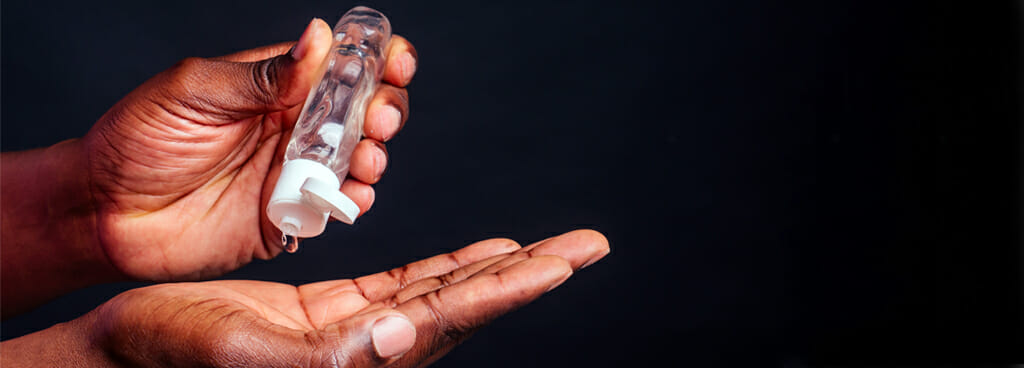- Home
- Services/IndustriesServicesindustries
- About Us
- LocationsStatesAccordion ContentAccordion ContentAccordion ContentAccordion Content
- Job Openings
- Quick Links
- ATS Family

Hand Sanitizer Testing
Applied Technical Services performs hand sanitizer testing to help manufacturers verify the purity of their product and validate their production procedures. This class of topical antiseptic serves as a critical hygiene tool, with alcohol-based versions capable of killing upwards of 99% of infectious bacteria and viruses when applied correctly. Both medical professionals and average consumers rely on hand sanitizer daily to disinfect their hands before undertaking a variety of tasks that could otherwise expose them or someone in their care to infection.
Contaminated samples can negate any hygiene benefit derived from using hand sanitizer, however, by introducing bacteria directly into the application site. Industry standards and regulatory bodies require a certain level of purity to preserve the effectiveness of the product. For these reasons, manufacturers must take special care to prevent contamination in their production processes. Chemical analysis labs like ATS provide testing services to detect, measure, and identify contaminants in hand sanitizer samples.
FDA Findings and DHHS Recommendations
Recent research conducted by the Food and Drug Administration (FDA) has shown that, in the wake of the Coronavirus pandemic and the consequently heightened demand for disinfectant products, various hand sanitizers making their way to the market use substandard alcohol. While approved hand sanitizers use ethanol or isopropanol, these products are either contaminated with methanol or use it to replace an appropriate alcohol ingredient entirely. This compound is toxic to humans, causing negative health effects ranging from nausea to death depending the level of exposure.
To prevent such exposure, the Department of Health and Human Services (DHHS) has updated their guidance on preparing hand sanitizer to hold manufacturers accountable for methanol content in their products. No alcohol ingredient used as a disinfecting agent in hand sanitizer may contain more than 630 parts-per-million (ppm) of methanol. ATS can detect methanol in sample matrices at concentrations lower than those required by DHHS recommendations due to our sensitive equipment and experienced organic chemists.
How the Method Works: GC-MS
Our organic chemistry division accomplishes this analysis through a method called Gas-Chromatography/Mass-Spectroscopy. Testing begins when our chemists introduce a liquid sample to the gas chromatograph. This advanced equipment vaporizes the analyte and pushes it through a tube using an inert carrier gas, which carries it off for detection. Once it reaches its destination, the mass spectrometer measures and identifies the vapor molecules according to their mass. Most often referred to as GC-MS, this test allows our labs to detect trace amounts of organic compounds — down to the parts-per-trillion (ppt) level, a much more precise measurement than required by most regulatory guidelines.
Once our chemists have identified contaminants in a hand sanitizer sample, we can work with clients to determine the source of contamination to help them correct the problem. ATS performs GC-MS according to a variety of industry standards and client-specific specifications — we encourage potential customers to reach out with their testing needs so that we may discuss how best to accommodate them.
About ATS
Applied Technical Services provides our exceptional testing, inspection, and consulting engineering capabilities to clients around the world. Since our founding in 1967, we have enjoyed tremendous growth due to the tireless efforts of our dedicated employees. While ATS once consisted of three engineers working alongside local companies from our founder’s basement office, we have transformed over the past five decades into a multidisciplinary firm offering the services of over 1,000 chemists, Professional Engineers, forensic investigators, inspectors, scientists, trainers, technicians, and calibrators to clients from a variety of industries. Of the many we regularly serve, the consumer product and healthcare industries primarily benefit from our capacity as an expert hand sanitizer testing lab.
Our Dedication to Quality
All hand sanitizer testing occurs within the scope of ATS’ stringent quality assurance program, registered to ISO 9001. Our Marietta Lab achieved this distinction by allowing ISO-approved auditors to inspect the entirety of our business processes for compliance with the internationally recognized standard on effective quality management practices. We have maintained our certified status without interruption since 1998 by submitting to periodic recertification audits. ATS participates in this exacting process because it helps us to continually improve ourselves — both the scope and the quality of our services. We are determined to provide our clients with every reason to work with us again in the future.
Our labs uphold several policies to ensure a positive customer experience. First, our testing specialists return their findings quickly. They provide clear, accurate, and detailed reporting to empower the client to make informed decisions regarding their sample. Second, we acknowledge that sometimes clients will have questions. ATS maintains a team of customer service representatives who receive client outreach and facilitate contact with the most relevant staff member. Finally, lab personnel remain accessible to clients with questions about either the status or results of their testing. These experts are responsive to the client’s needs and remain engaged while helping secure a solution to their problem.
If your company need hand sanitizer testing, contact ATS today about a free quote — We take a closer look!

Request Form
"*" indicates required fields
